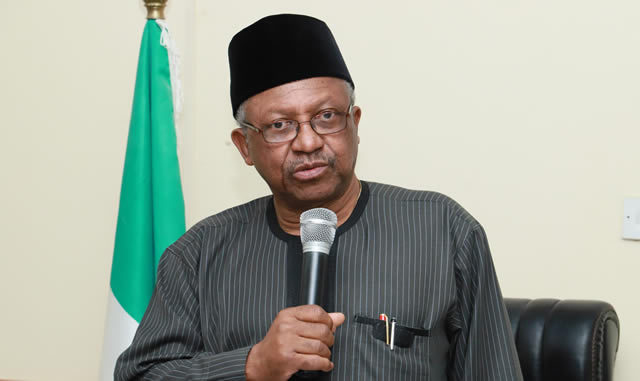The Minister of Health, Dr Osagie Ehanire, on Thursday said COVID-19 patients, who spent a long period at isolation centres were at the risk of depression.
Ehanire, who stated this in Abuja at the press conference of the Presidential Task Force on COVID-19, said government planned to deploy psychologists in isolation centres to take care of such patients.
At the press conference, the Director General of the Nigeria Centre for Disease Control, Dr Chikwe Ihekweazu, said the task force was reluctant to adopt home treatment it once proposed because of conditions under which Nigerians live.
He also asked professional groups and faith-based organisations, including churches and mosques, to submit guidelines for reopening to the NCDC to review and advise.
But explaining effects of long treatment on some patients, the health minister stated, “On the mental health issue of those in isolation, who have stayed a little bit longer, some people do get a little bit of mental depression. This mental health issue is under consideration. It (a policy) is also being developed in states to have psychologists create things to engage those in isolation.”
He also said the Federal Government had intervened in the sit-at-home protest embarked upon on Wednesday by the Lagos State chapter of the Nigerian Medical Association, following harassments by the police, who were enforcing a nationwide curfew imposed by the President, Major General Muhammadu Buhari (retd.)
The minister stated, “With regard to the industrial action by doctors in Lagos, I spoke with the NMA Chairman of the Lagos Chapter on Wednesday to dissuade the doctors from the planned sit-at-home protest in the state, and I listened to their complaints too on harassment at security check points.”
The health minister said the Federal Government’s team sent to Cross River State on Monday had returned and its report stated that there was no confirmed case yet in the state.
Besides Cross River State, Kogi State has not recorded any COVID-19 case, but the NCDC officials, who were sent to the North-Central state went back to Abuja without accomplishing their mission following the insistence of the state government that they must be in isolation for 14 days.
On Thursday, the minister noted that an analysis of the 200 COVID-19 deaths recorded so far in the country revealed a 70-30 per cent ratio for males and females.
Ehanire said, “A finding from our analysis of deaths shows the ratio is 70 to 30 for men and women respectively. About 70 per cent were over 60 years of age, while the majority of positive cases were between 29 and 49 years of age, being the most outgoing segment of any society. I also advise all who have taken the test and are awaiting result to self-isolate at home, wear face masks and observe hand and respiratory hygiene until the result is out.
“The fact-finding team to Calabar is back to Abuja with a report. We have identified areas in need of upgrade to include laboratory facilities. No case of COVID-19 was reported by the state as at May 20. Also, 16 suspected cases have been tested, with all being negative.”
Don’t disobey 14-day compulsory quarantine agreement, minister warns returnees
He said Nigerians who were being evacuated from other countries should not disobey the 14-day compulsory quarantine agreement they signed as a condition for their evacuation.
He said, “On the issue of evacuees, there are issues with compliance. Although part of the conversation we have had with the Ministry of Foreign Affairs is that those who are leaving the foreign countries must understand that they are going to be in quarantine for 14 days.
“It is a requirement for the country and it is something they signed for. It is part of the agreement.”
The PTF Chairman and Secretary to the Government of the Federation, Boss Mustapha, at the press briefing, advised state governments to ensure restriction of movements between local government areas except for healthcare.
Nigerians purchasing chloroquine in large quantities, PTF says
The PTF chairman also raised the alarm that the government had received reports of abuse and misuse of chloroquine as a cure for coronavirus.
He said, “Through the surveillance system set up by the PTF, we have received reports that Nigerians have been purchasing hydrxoychloroquine in large quantities.
“We wish to reiterate that this drug has not been certified for use in treating COVID-19 in Nigeria by the relevant health and pharmaceutical authorities. Self-medication of any kind is fraught with the danger of increasing risks of avoidable casualties.
“We, therefore strongly warn against self-medication. If you are sick, please seek medical advice and if you are confirmed positive, kindly self-isolate in an approved facility. The COVID-19 is highly infectious and dangerous.”
Calls for caution during Eidel-Fitri celebration
Mustapha urged Nigerians to be cautious during the celebration of the Eidel-Fitri in order to avoid the spread of the virus.
He said, “The foregoing admonition becomes critical as we prepare for celebrations at the end of the month of Ramadan.
“It is the prayer of the PTF that we shall all celebrate this Sallah and many more in good health and beseech the Almighty to accept our supplication and look upon our nation and the world, with mercy.
PTF cautions police, security agencies against harassing journalists, doctors
The SGF also cautioned the police and other security agencies against harassing journalists, health workers and other essential workers.
He expressed concerns that they were still being daily harassed despite clear guidelines issued on essential workers.
He said, “For the avoidance of doubt, essential workers, including our indefatigable medical personnel, diligent journalists, courageous fire service personnel, telecommunications workers, are all exempted.
“The Inspector General of Police has further clarified the categories of essential workers in alignment with the guidelines and has issued instructions to security agents to work on the approved exemptions.
“With this clarification, we sincerely hope that the persistent complaints of harassment by these categories of essential workers, especially medical personnel and journalists would be put to rest so that we can harmoniously work in battling this pandemic.
“The PTF COVID-19 urges all essential workers to go about their legitimate duties carrying with them valid means of identification and to exercise courtesy in approaching security personnel.”
The National Coordinator of the PTF, Dr Sani Aliyu, urged states to create mobile courts for the prosecution of offenders of the protocols and to enforce restriction of interstates movement.
He said, “People may go out to buy necessary food and for exercise. Movement between local government areas is strongly discouraged unless for critical reasons such as healthcare.”
According to him, interstates movements remain banned except for essential services while schools, bars, pubs, clubs remain closed until further notice.
Aliyu asked banks and offices to prepare for life after post COVID-19.
He added, “For banks and other financial institutions as well as offices, now is the opportunity to start adjusting to a new life post- COVID-19 as we lift restrictions over the next two weeks.”
He asked them to maintain physical distancing, provide hand washing facilities and to ensure staff working in the office were not more than 50 per cent.
The House of Representatives Ad Hoc Committee on COVID-19 at the press conference urged loyalists of the President, the National Assembly members, governors and chairmen of local government areas to obey rules on COVID-19.
The Chairman of the committee, Mr Haruna Mshelia, noted that the majority of those infected with coronavirus were asymptomatic.
The lawmaker referred to the comments earlier made by the NCDC boss and the Minister of Information and Culture, Lai Mohammed, about preventive measures.
Transporters send COVID-19 guidelines to PTF
On his part, the NCDC boss said the centre had received a draft of guidelines by the Public Transport Owners of Nigeria Association to reopen interstate transportation while preventing the spread of the coronavirus pandemic.
He urged other organisations and communities to come up with similar guidelines to expedite the process of safely reopening the economy.
Ihekweazu said, “I was happy yesterday to receive a new set of draft guidelines by the Public Transport Owners of Nigeria Association. Those are people that manage the long distance buses that travel across the country, what we call ‘luxury’ buses.
“They had drafted their own guidelines for reopening safely and sent it to us for review and to advise them on the measures they are now recommending on how to manage their loading centres, buses and engagements with their customers at the point when we may allow them to reopen.
NCDC asks churches, mosques, others to submit guidelines for reopening
“This is what we’ve been advising every society, organisation, community, be it faith-based, cultural based, professionally based, to come up with guidelines for themselves. We are happy to advise and engage, but this needs to be led and owned by the leaders of those organisations.”
The NCDC DG added that every stakeholder in society needed to take responsibility of the part it owned and managed.
On testing in the country, he said the Federal Government would deploy 17 Gene Xpert machines next week.
The device, which is one of the most widely-used tuberculosis diagnostic tools in the world, has been deployed in some countries for conducting rapid COVID-19 tests.
Ihekweazu said, “We have about 400 Gene Xpert machines across the country. Not all of them are appropriate for COVID. We need those that have a safety cabinet where they are located. We also need those that are functional. Some of them have been around for quite a while.
“We have to prioritise, so we continue to do this. Seventeen of them are immediately ready for deployment in the first phase, which will start next week. I’m happy to announce that our first set of Gene Xpert cartridges will arrive in Nigeria on May 25.”
He added that there were criteria for deciding which state would get the machines first.
According to him, the primary recipients will be states without any laboratory at all, followed by states with high numbers of cases.
On the criteria for discharge of COVID-19 patients, Ihekweazu stated that the policy had been reviewed from two negative tests to one.
The NCDC DG also addressed concerns that the agency’s national database on COVID-19 cases and deaths did not reflect the mysterious deaths in Kano State, which are still under investigation.
Last month, hundreds were said to have died in strange circumstances within two weeks.
Ihekweazu said, “In terms of adding the deaths in Kano to our national database, our national database, at the moment, is based on biologically confirmed cases, that is, cases confirmed on PCR (polymerase chain reaction).
“Once the results of the Kano study are completely verified, we will note them but we will not include them in our database because of the difference in methods in estimating the number of people infected and have died in that particular context.”
He also advised Nigerians to accept the fact that COVID-19 is real.
He said, “An issue that has led to a bit of conversation and consternation in some places are visuals of people in treatment centres in relative comfort, and the anxiety that has led to discussions, comparing those images to the images we also see on TV of very severe cases in different parts of the world.
“This is an imagery we don’t want to see in Nigeria, but if we have to, we will deal with it. It’s always important to remind people of the full spectrum of clinical presentation we see with this new virus.
“We see a new disease that, in 80 per cent of cases, people are mildly or completely asymptomatic, i.e. they don’t have any symptoms at all. Under normal circumstances, there won’t be any reason for these people to be in hospitals and isolated.”
While explaining that isolation was to prevent transmission to others, the NCDC boss noted that many countries carried out a similar policy when the outbreak first started.
He stated, “They treated all the severe cases in hospitals and isolated every single person that was infected in temporary isolation centres, some of which you saw being built in two weeks.
“In other countries in the world, in Germany, Western Europe, the US, they’ve made a decision to treat all asymptomatic or mildly symptomatic people at home. That’s a decision they have made in that context.
We are reluctant to adopt home treatment, says FG
Ihekweazu explained why the PTF could not go ahead with home treatment of COVID-19 patients it once proposed,
He said, “We have struggled with these decisions in Nigeria because we are struggling with the realities of where we live and the contexts that we live in. We want to prevent transmission, therefore we want to institutionalise the treatment of everyone,
“We recognise that the circumstances that many Nigerians live in make home isolation difficult and, sometimes, an impossible option for many people who live in very tight accommodation in family groups and communities.”
Lagos releases COVID-19 home treatment guidelines next week
But while the Federal Government said it was reluctant to adopt home treatment, the Lagos State Government on Thursday promised to release the parameters for home treatment of coronavirus cases next week.
The state Commissioner for Health, Professor Akin Abayomi, said the development became necessary because many residents who tested positive for the COVID-19 refused to go to the state isolation centres.
He spoke while fielding questions from journalists during a press briefing at the Lagos House, Alausa.
The commissioner said the state isolation centres were filled to 60 per cent capacity, adding that the facilities had yet to fill up because as the government admitted patients, it also discharged others.
Some positive patients cannot be found – Lagos commissioner
He, however, noted that another reason the facilities were not filled was because some positive cases could not be found.
Abayomi, who blamed this on stigmatisation, wondered why coronavirus patients were discriminated against in society.
The health boss compared COVID-19 to malaria, cold and flu, saying there was no reason for stigmatisation.
He stated, “So, there are people who are already practising self-isolation on their own, because we can’t find them, and the numbers they give us maybe they are false numbers. When we go to visit them in their homes, they had absconded from their residences. They are isolating themselves in different places.
“In effect, the concept of home isolation is being practised by many Nigerians even though it is not a national policy, but the people of Lagos are practising home isolation, which is one of the reasons as a government we are trying to transit to home care because it is happening anyway. So, we might as well regularise it and make it an official option for some people who are mild or asymptomatic to isolate themselves at home.
“We are spending a lot of time working around parameters of what home isolation will look like. In another week or so, we will give definitive parameters on how the state will integrate home care with our isolation strategy.”
He explained that due to the global scarcity of reagents, the government contacted local scientists to produce alternatives.
Abayomi said two of the three reagents needed for COVID-19 tests had been manufactured locally, thereby reducing the pressure to import the product. He added that efforts were on for the local production of the third reagent.
LASG spends N720m to test 16,000 patients
The commissioner explained that as of now, it cost the government between N40,000 to N50,000 to conduct a COVID-19 test, saying 16,000 tests had been done so far.
At an average cost of N45,000 per test, it meant Lagos had spent N720m on coronavirus tests.
Abayomi noted that the state government in a week planned to ramp up testing from 800 to 1,000 per day.
He said, “Well for now, the government is providing testing free of charge. And the government pays about N40,000 to N50,000 per test. But as we ramp up our testing, we will have to use some means of subsidising those tests either through insurance or some contributions from donors or developmental partners to help us subsiside the tests.”
The health commissioner said the country was at the stage of active community spread and appealed to those who had the infection to go public with their results.
He said sooner or later, most residents would catch the virus.
“This issue of stigma is what we must get rid of. If you have COVID, tell people you have it. COVID catches everybody. There is nobody that is immune to it. Stop hiding,” he added.
The health commissioner maintained that the state was on course to register up to 90,000 confirmed cases by the end of July
Credit:Punch












Leave a Reply